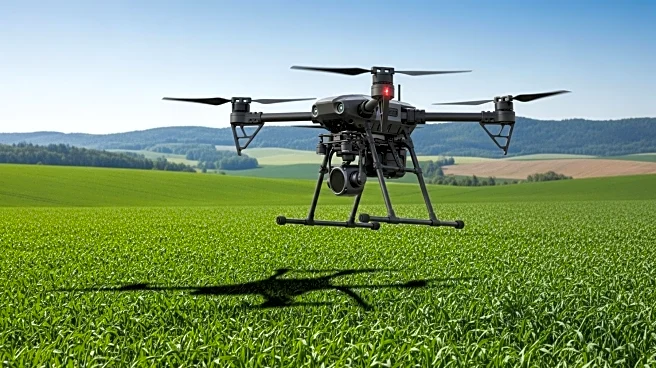What is the story about?
What's Happening?
Artificial Intelligence (AI) is transforming the agriculture sector by shifting decision-making from intuition-driven to evidence-driven processes. AI technologies are being integrated across the agricultural ecosystem, from soil health and irrigation to logistics and retail. Low-cost soil sensors track moisture, temperature, and pH levels, providing data that AI models use to recommend irrigation schedules and nutrient requirements. Drones and satellites enhance crop management by identifying plant stress and uneven growth, allowing for targeted interventions. AI also aids in early disease detection through phone cameras and drone feeds, offering farmers diagnoses and treatment options. Smart irrigation controllers optimize water usage, reducing costs and improving yields. Robotics and automation are being employed to address labor shortages during harvest, while computer vision systems sort and grade produce efficiently, enhancing market value.
Why It's Important?
The integration of AI in agriculture is crucial for enhancing productivity and sustainability. By providing precise data-driven recommendations, AI helps farmers optimize resource use, reduce costs, and increase yields. This technological shift supports climate resilience by suggesting crop mixes and sowing dates that align with local weather patterns. AI-driven solutions also promote environmental sustainability by minimizing the use of fertilizers and pesticides, protecting soil health and water bodies. The adoption of AI technologies can lead to more resilient and profitable agricultural practices, addressing challenges such as unpredictable weather, water scarcity, and rising input costs. However, successful implementation requires overcoming barriers like connectivity issues and building trust among farmers.
What's Next?
For AI to be effectively integrated into agriculture, connectivity issues in rural areas need to be addressed. Tools must be made available in local languages and adapted to the habits of new users. Trust in AI recommendations can be fostered through accurate advice and support from local agronomists. Interoperability among various technologies is essential for seamless integration, and governments and industry bodies can facilitate this through open standards and shared registries. As AI becomes standard in agriculture, the sector is expected to become more resilient and profitable, with decisions based on precise data rather than broad averages.
Beyond the Headlines
The adoption of AI in agriculture has ethical and cultural implications, particularly in terms of data privacy and the potential displacement of traditional farming practices. Ensuring that AI technologies are accessible and beneficial to small-scale farmers is crucial for equitable growth. The shift towards data-driven agriculture may also influence cultural perceptions of farming, emphasizing technological proficiency alongside traditional knowledge.

















